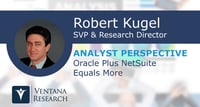
Oracle and NetSuite have completed their merger. The combination is likely to be positive for customers because NetSuite will have access to “more,” a word repeated many times over the course of Oracle’s post-acquisition webcast. Existing NetSuite customers will benefit from increased investment as well as economies of scale that Oracle can bring to R&D and sales and marketing. Oracle has stated that there’s little overlap between its target customer base and NetSuite’s. However, there is...
Topics: Sales, Customer Experience, Human Capital Management, Marketing, Office of Finance, Continuous Planning, Customer Service, HRMS, Inventory Optimization











